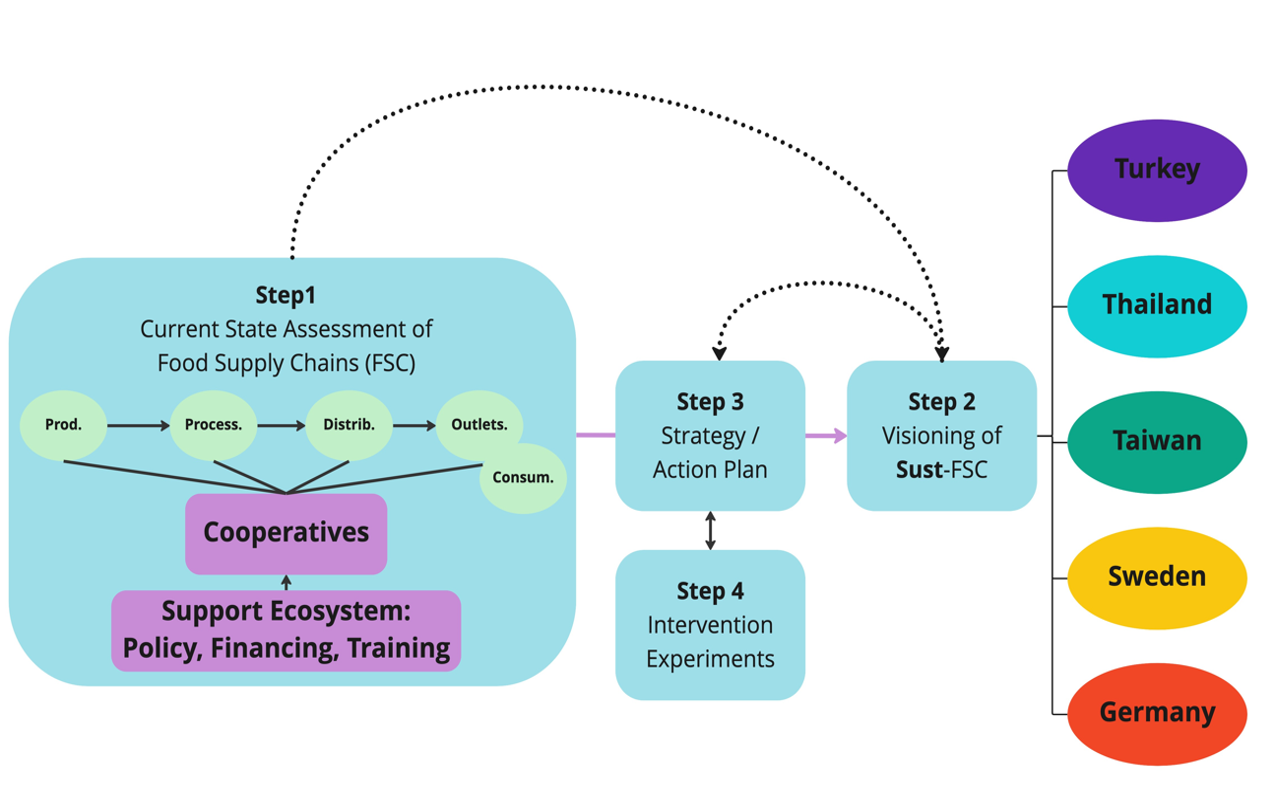CO-SFSC: Co-Creating Sustainable Transformations of Food Supply Chains through Cooperative Business Models and Governance
Project background
Climate change, the COVID-19 pandemic, and the war in the Ukraine reveal unsustainable features of conventional, globalized food supply chains, including significant GHG emissions, food insecurity, high food prices, injustices against workers, and dependence on trade partners violating human rights. Various efforts have been undertaken to transform food supply chains (FSC) towards sustainability by reducing transport, paying fair prices, adding value in the region of origin, adopting worker safety standards, and increasing accountability along the supply chain from production to consumption. Cooperative business models, such as worker or consumer cooperatives, as well as cooperative governance such as food policy councils or community-supported agriculture adopt many of these sustainable practices. Yet, there is little empirical, comparative research on how to implement sustainable food supply chains through cooperative models. Research suggests the need for rapid implementation of sustainable agri-food systems solutions to avoid exacerbation of detrimental climate change, economic injustices, and negative health impacts (cf. SDGs) There is increasing research interest in investigating food supply chains (FSC), cooperative food businesses, and cooperative governance for advancing sustainability. Analytical, anticipatory, and strategic sustainability research is extended into transdisciplinary real-world experiments to create actionable knowledge for sustainable agri-food systems.
Co-SFSC coordinates transdisciplinary research across five research “hubs” and with six teams in Turkey, Thailand, Taiwan, Sweden, Germany and the U.S., building a Community of Practice for mutual learning (Lave & Wenger 1998). The project is part of the Belmont Forum Collaborative Research Action Systems of Sustainable Consumption and Production (#SSCP2022). CO-SFSC is one of the first projects presented on Belmont Forum’s new website in the form of a visual story.
The goal is to assess current food supply structures (incl. policies, financing, training) and to develop sustainable ones through innovation and transfer of cooperative business and governance models. Following Weber & Wiek (2021), the research process will be structured into four steps:1) transdisciplinary sustainability assessment (system knowledge), 2) transdisciplinary sustainability visioning (target knowledge), 3) transdisciplinary strategy building and action planning (transformation knowledge I), and 4) transdisciplinary design, monitoring, and evaluation of pilot projects/experiments (transformation knowledge II).

Work Packages of CO-SFSC
WP1 Coordination and Community of Practice
assures overall coordination and management of the project, and organizes the CoP process.
WP2 Transformational Sustainability Research Methodology
focuses on sustainability and transformative sustainability research methodology.
WP 3 Governance and Supporting Entrepreneurial Ecosystems
provides a framework for identifying, comparing and generating actionable knowledge on governance schemes and entrepreneurial ecosystem functions in support of cooperative businesses and SFSC.
WP4 Cooperative Business Models
generates empirical evidence on the role and success factors of cooperative food businesses for advancing SFSC
WP 5 Communication, Dissemination and Exploitation
provides a frame for sharing research results with potential users ensuring open access and adaptability to different target audiences and contexts
